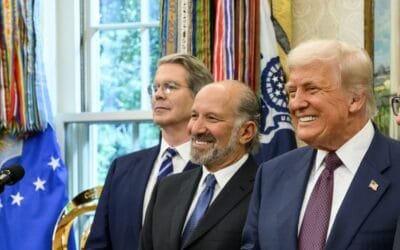When government bureaucrats call for “inclusive” capitalism and “fair” markets, you know they are not doing so out of compassion for the poor or of sense of justice. They do it to protect their positions of power and to justify their jobs as the regulators of the economy and the markets. Let’s analyze a recent example to see what is wrong with the bureaucrats’ argument. Last week in London, Bank of England governor Mark Carney, a very powerful bureaucrat, criticized capitalism for being “prone to extremes” and called for market “fairness” at a conference on “inclusive capitalism,” undoubtedly envisioning himself as a moderator of capitalism and a corrector of market “unfairness.” (See a National Post column by William Watson on Carney’s talk, including a partial transcript, here. Peter Foster also comments on it here.)
The problem with Carney’s arguments is that they are based on an illusion. There is no such thing as “extreme” capitalism and “unfair” (free) markets. It is the government efforts to “moderate” capitalism and to make markets “fair” that create the unfairness they claim to alleviate. Thanks to the governments and their bureaucrats like Mr. Carney, there is no pure capitalism and free markets anywhere in the world today—despite the fact that pure capitalism is the social system most consistent with the requirements of human survival and flourishing.
In Ayn Rand’s definition, capitalism is “a social system based on the recognition of individual rights, including property rights, in which all property is privately owned.” There is nothing “extreme” about such a system; it is merely principled: individual rights are upheld consistently. People living in a capitalist system are free and can count on the government to protect their rights. Capitalism is just: those who produce and create wealth are entitled to keep the results of their efforts—or use them as they wish. The government cannot forcefully take away the producers’ wealth and give it to those who claim “need” for it, as it does in our mixed economies in England and elsewhere. Under capitalism the government does not play any role in the economy (including running a central bank); it merely protects individual rights against the initiation physical force and fraud.
When capitalism is made “moderate” by compromising the principle of individual rights, for example, when someone claims “inequality” and wants a share of someone else’s property, the social system ceases to be capitalism and becomes a mixed economy, our prevailing system. In a mixed economy individual rights can be compromised any time the government decides that “public interest” warrants it. Government can decide to print money, causing inflation, or to dictate interest dates, interfering with the freedom of the banking industry. In a mixed economy, government can “moderate” capitalism in a myriad of other ways, such as by evoking eminent domain and unjustly seizing individuals’ property for a public housing project, say, or it can impose taxes to equalize people’s incomes.
Besides calling for “moderate” capitalism (in other words, a mixed economy where a central bank governor has a powerful role …), Mark Carney also argued that free markets are not “fair” because the inevitable inequality in income and wealth that characterizes them. But free markets are nothing if not fair: they reward people according to their productivity—and benefit even the least productive through the opportunities that the wealth creation and investment by the most productive create. (As I argued in a previous article, by the standard of human survival and flourishing, income inequality does not matter but freedom and productivity do.)
Bureaucrats like governor Carney want to perpetuate our current unjust system that curtails our freedom and hampers our prosperity and well-being. However, many people are persuaded by Carney’s arguments because they accept the philosophy on which such arguments are based: altruism and collectivism. But if they truly cared about others’ well-being, and that of their own, they would accept their own happiness as their moral purpose and respect for others’ individual rights as the main principle governing social interaction. And they would embrace capitalism as the ideal social system that makes human flourishing possible.




